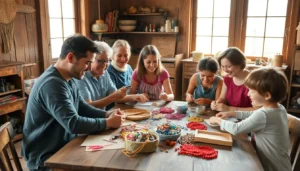Table of Contents
ToggleFamily traditions are the glue that holds loved ones together, often sprinkled with laughter, a dash of chaos, and a whole lot of love. They create lasting memories and give everyone something to look forward to, whether it’s Grandma’s infamous holiday casserole or the annual backyard campout that inevitably ends with a raccoon raid.
In a world that moves at lightning speed, these cherished rituals remind families to slow down and enjoy the little moments. From quirky game nights to heartwarming storytelling sessions, traditions can be as unique as the families that create them. Ready to dive into some delightful examples that might inspire new traditions or rekindle old ones? Let’s explore how these practices enrich family bonds and keep everyone coming back for more—after all, who wouldn’t want to be part of a tradition that involves pie?
Importance Of Family Traditions
Family traditions play a crucial role in nurturing relationships and enhancing the family experience. They cultivate a sense of identity and belonging for each family member.
Strengthening Family Bonds
Family traditions strengthen connections among members by fostering shared experiences. Engaging in regular activities, like weekly game nights or seasonal celebrations, promotes interaction. These interactions build trust and familiarity. Traditions also provide a platform for open communication, allowing family members to express themselves. Over time, the continuity of these rituals cultivates resilience within the family unit. The bonds formed during these moments endure, even during challenging times.
Creating Lasting Memories
Fond memories often arise from family traditions that create unique experiences. Activities like baking favorite recipes or storytelling during holidays become cherished recollections. Such traditions instill a sense of nostalgia, linking the past to the present. Each gathering adds depth to family history, enriching individual identities. Lasting memories encourage families to reflect on shared experiences. Families often pass down these memories, reinforcing connections across generations. Ultimately, they play a vital role in shaping family narratives and individual experiences.
Types Of Family Traditions

Family traditions come in various forms, enriching connections and memories. Below are three significant types of family traditions:
Holiday Celebrations
Holiday celebrations often bring families together, fostering a sense of unity. Families might gather for Thanksgiving dinner, sharing cherished recipes and stories. During Christmas, decorating the tree or singing carols can create joyful moments. New Year’s celebrations might include special activities like making resolutions together. Festivities provide opportunities for bonding, emphasizing gratitude and togetherness.
Weekly Rituals
Weekly rituals serve as consistent touchpoints in family life. Dedicating time each week for a movie night allows family members to unwind together. Families may set aside Sunday mornings for brunch, enjoying homemade dishes and laughter. Game nights encourage friendly competition and teamwork, strengthening relationships. These regular activities instill a sense of rhythm and predictability, enhancing family dynamics.
Cultural Practices
Cultural practices highlight the traditions unique to each family’s heritage. Families might celebrate specific holidays such as Diwali, Hanukkah, or Lunar New Year. Storytelling, sharing folklore, and passing down customs keep cultural histories alive. Special dishes prepared during these events often connect younger generations to their roots. Cultural practices deepen family bonds while instilling pride in one’s identity.
Examples Of Family Traditions
Family traditions can take many forms, each enriching the family’s connection and history. Here are some notable examples that illustrate how families celebrate and bond.
Family Game Night
Families often gather for game night, a time for laughter and friendly competition. Popular board games encourage teamwork and strategy among family members. Consistently hosting this event fosters bonding, creating lasting memories. Playing games like Monopoly or Uno allows everyone to disconnect from technology briefly. Often, snacks accompany the games, enhancing the social aspect of the evening. Families look forward to this ritual, making it an intrinsic part of their routine.
Annual Family Reunions
Annual family reunions serve as a momentous occasion for relatives to reconnect. These gatherings often occur during holidays or summer, allowing extended families to come together. Diverse activities, such as picnics, sports, and storytelling, engage members of all ages. Photos captured during these reunions create cherished keepsakes that commemorate these gatherings. Reinforcing ties, families share updates on life events and milestones, strengthening relationships. Every reunion nurtures a sense of belonging and unity across generations.
Cooking Traditional Meals
Cooking traditional meals represents a time-honored family tradition that transcends generations. Many families gather in kitchens to prepare recipes passed down through family lines. Recipes for lasagna or tamales often hold emotional significance, enriching the cooking experience. This shared activity not only fosters culinary skills but also sparks conversations filled with memories. Families typically enjoy these meals together, deepening connections and honoring cultural heritage. Celebrating through cooking strengthens identity, leaving a legacy of flavors and stories.
Tips For Establishing Family Traditions
Establishing family traditions enhances connections and creates cherished memories. These tips can guide families in forming their own rituals that resonate with everyone.
Involving Everyone
Involving each family member fosters a sense of ownership and excitement about traditions. Find out preferences that everyone shares, ensuring the traditions reflect collective interests. Encourage participation in planning and implementing activities, allowing room for individual creativity. Gather input when selecting themes for celebrations or rituals, making everyone feel valued. Prioritize inclusion, as this strengthens the family bond and makes traditions more meaningful. Celebrate small successes and acknowledge contributions from each participant to reinforce enthusiasm.
Keeping It Simple
Keeping traditions simple ensures they remain enjoyable and accessible. Select activities that require minimal preparation, reducing stress and allowing for spontaneity. Establish routines that fit naturally into the family’s lifestyle, like Saturday morning pancakes or Sunday game time. Avoid overwhelming schedules by setting realistic expectations for participation and frequency. Ensure traditions are flexible, accommodating family members’ varying schedules and preferences. Simplifying the process enables families to focus on the joy of being together, allowing traditions to thrive without added pressure.
Family traditions are the heartbeat of a household. They create a tapestry of shared experiences that enrich relationships and foster a sense of belonging. By embracing these rituals families can cultivate lasting memories that resonate through generations. Whether it’s a weekly game night or an annual reunion each tradition serves as a unique thread that strengthens family ties.
As families explore new traditions or revive old ones they not only celebrate their unique identities but also enhance their connections. The joy found in these shared moments is invaluable. It’s through these traditions that families can navigate life’s challenges together while cherishing the beauty of togetherness.




